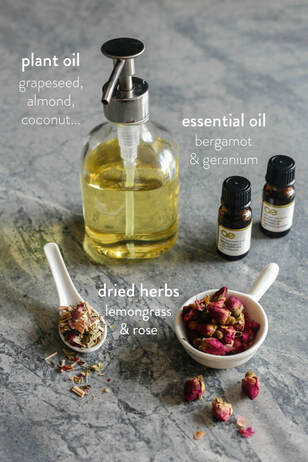 According to the Environmental Working Group (www.ewg.org), an amazing scientifically-backed advocacy organization worth checking out, the average American uses upwards of 15 personal care products — with a total of 126 different ingredients — multiple times a day! Sound like a lot? Think about it. We wash our hands, brush our teeth, shower and wash our hair and body, apply moisturizer, maybe put on makeup, sunscreen and/or lip balm. And, we repeat some of these rituals several times a day. I like to say “if you would not eat it, then don’t put it on your skin.” After all your skin is your largest organ and rapidly absorbs what you put on it directly into the bloodstream. Sadly, we can’t trust the cosmetics industry to protect us from toxic chemicals. The personal care industry uses over 10,000 chemical ingredients, some of which are linked to cancer, damage the reproductive system, or disrupt the endocrine system. Yet, the Food and Drug Administration (FDA), doesn’t conduct or require any safety testing of ingredients in personal care products. To put the lack of regulation in perspective, the European Union has banned more than 1,000 ingredients from use in cosmetics, while the US FDA has prohibited only 9. Chemical toxins can cause harm each time they are used and can bioaccumulate, meaning they get stored in tissue and build up over time. That’s why multiple small exposures may eventually lead to serious health issues. So, what can you do about it? 1. Memorize the “dirty dozen” list of primary ingredients used by several companies that are toxic. (See list below) 2. Read all ingredient labels carefully! 3. Permanently avoid any products that contain “the dirty dozen” toxic ingredients. 4. Purge your bathroom, kitchen, makeup case and get rid of anything that contains the ingredients listed below and replace them with toxin-free alternatives. You don’t need to break the bank; simple products like coconut oil can make incredible body lotions. You can easily find countless awesome natural alternatives in every health food market or online. 5. Be wary of marketing. The US government does not regulate the words “natural” or “organic.” To carry USDA Organic Seal of Approval, at least 95 percent of the ingredients must be organic. Only purchase Products containing the USDA approved seal! 6. Educate yourself. I guarantee once you understand HOW these chemicals can affect you, you will stop using them!
DIRTY DOZEN: 12 INGREDIENTS TO AVOID IN COSMETICS 1. BHA and BHT 2. Coal tar dyes 3. DEA 4. Dibutyl phthalate 5. Formaldehyde-releasing preservatives 6. Parabens 7. Parfum (a.k.a. fragrance) 8. PEG compounds 9. Petrolatum 10. Siloxanes 11. Sodium laureth sulfate 12. Triclosan Let knowledge drive action! Check out the Environmental Working Group’s comprehensive website to learn more scientifically grounded information that explains how various chemical ingredients affect us and ranks products by safety score to help consumers make informed choices. Photo: https://littlegreendot.com
0 Comments
 The abundance of spring flowers mixed with breezy days creates the perfect recipe for seasonal allergies. When pollens and molds get into our airways, the body’s immune system launches an attack that can lead to inflamed, itchy, watery, red eyes, nose and skin, not to mention fatigue! There’s a lot you can do to help your body naturally. Before reaching for that antihistamine, give these alternatives a try!
2. Avoid histamine-rich and histamine-releasing foods including:
3. Enjoy a teaspoon of raw, local honey. Raw local honey is full of the very pollen that your body is reacting to. This low-level exposure helps the body learn to recognize the pollens as safe and build your immunity, reducing the severity of reactions. 4. Drink turmeric tea or add turmeric to your cooking. Turmeric’s natural antihistamine and anti-inflammatory properties can reduce your symptoms. 5. Include bone broth in your diet. Bone broth is rich in nutrients like collagen, which work to heal and soothe an inflamed gut., and since upwards of 80% of our immune system lives in our gut, adding natural gut supporters into your wellness routine can help fend off allergies. 6. Choose organic! Reduce your exposure to pesticides and other chemicals and artificial additives. These non-food items burden your body and get in the way of its capacity to fend off allergens. |
|
PAGES
|
SOCIAL
|
|
415.378.4689
|
Copyright © 2021 Jennifer Walsh
 RSS Feed
RSS Feed
